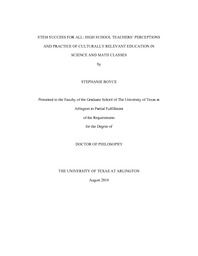
ATTENTION: The works hosted here are being migrated to a new repository that will consolidate resources, improve discoverability, and better show UTA's research impact on the global community. We will update authors as the migration progresses. Please see MavMatrix for more information.
Show simple item record
| dc.contributor.advisor | Tobolowsky, Barbara | |
| dc.creator | Boyce, Stephanie | |
| dc.date.accessioned | 2018-11-12T16:47:49Z | |
| dc.date.available | 2018-11-12T16:47:49Z | |
| dc.date.created | 2018-08 | |
| dc.date.issued | 2018-08-09 | |
| dc.date.submitted | August 2018 | |
| dc.identifier.uri | http://hdl.handle.net/10106/27589 | |
| dc.description.abstract | The lack of participation of historically underrepresented groups (i.e., Hispanics, Blacks, and women) in science, technology, engineering, and mathematics (STEM) is a serious issue in the United States. Despite the intentional efforts at increasing STEM participation, Black and Hispanic high school students graduate significantly less prepared for college-level mathematics and science than their White counterparts. As a result, they are more likely to underachieve in college and inadvertently continue the cycle of STEM underrepresentation in college.
Using an anti-deficit perspective, this study explored a single high school science and math department’s teachers’ perceptions about Culturally Relevant Education (CRE) practices as facilitating or hindering STEM interest and science and math achievement among students of color. The following four behaviors of culturally relevant educators were explored: (a) using culture as a bridge to connect to academic skills and concepts, (b) facilitating students’ critical reflection of their lives and society, (c) building students’ cultural competence to take pride in their culture, and (d) critiquing of discourses of power to challenge the status quo. The study was conducted in a high school primarily serving students of color that has met and exceeded state expectations for the last four years.
The study found that CRE practices were, in fact, perceived by teachers to be key in promoting the interest and academic achievement of their students. The teachers cited meaningful relationships with students, connecting their students interest with math and science content, the incremental process of empowering students, and departmental collaboration as the key contributing factors to their overall success. Recommendations and implications for practice, research, and policy are included. | |
| dc.format.mimetype | application/pdf | |
| dc.language.iso | en_US | |
| dc.subject | STEM | |
| dc.subject | Culturally responsive pedagogy | |
| dc.subject | Achievement gap | |
| dc.title | STEM SUCCESS FOR ALL: HIGH SCHOOL TEACHERS’ PERCEPTIONS AND PRACTICE OF CULTURALLY RELEVANT EDUCATION IN SCIENCE AND MATH CLASSES | |
| dc.type | Thesis | |
| dc.degree.department | Educational Leadership and Policy Studies | |
| dc.degree.name | Doctor of Philosophy in Educational Leadership and Policy Studies | |
| dc.date.updated | 2018-11-12T16:47:49Z | |
| thesis.degree.department | Educational Leadership and Policy Studies | |
| thesis.degree.grantor | The University of Texas at Arlington | |
| thesis.degree.level | Doctoral | |
| thesis.degree.name | Doctor of Philosophy in Educational Leadership and Policy Studies | |
| dc.type.material | text | |
| dc.creator.orcid | 0000-0002-5640-3138 | |
Files in this item
- Name:
- BOYCE-DISSERTATION-2018.pdf
- Size:
- 612.8Kb
- Format:
- PDF
This item appears in the following Collection(s)
Show simple item record


